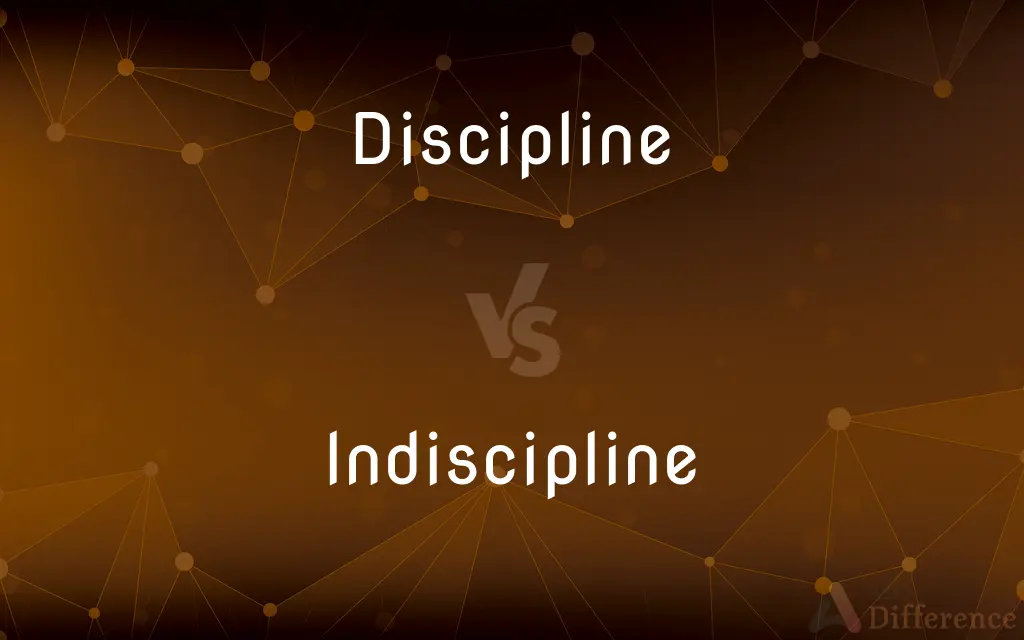Discipline vs. Indiscipline — What's the Difference?
By Urooj Arif & Fiza Rafique — Updated on March 26, 2024
Discipline involves adherence to rules and self-control, fostering order and progress, while indiscipline signifies a lack of control, leading to chaos and potential failure.

Difference Between Discipline and Indiscipline
Table of Contents
ADVERTISEMENT
Key Differences
Discipline is the practice of training oneself or others to obey rules or a code of behavior, using punishment to correct disobedience. It's essential for maintaining order and achieving long-term goals. Whereas indiscipline refers to the absence or defiance of control and authority, often resulting in disorder and unpredictability. This contrast affects both individuals and collective entities like schools, workplaces, and societies.
Discipline can manifest as self-discipline, where individuals regulate their own actions for improvement or to meet personal or professional goals. This self-regulation is crucial for personal development and success. On the other hand, indiscipline in individuals might lead to procrastination, lack of focus, and ultimately, failure to achieve their objectives, showing how self-management impacts outcomes.
In educational settings, discipline is pivotal for creating an environment conducive to learning, where students respect rules and teachers' authority. This setting promotes not just academic learning but also the development of social skills and ethics. Whereas, classrooms characterized by indiscipline may struggle with teaching effectively, as disruptions and lack of respect hinder the educational process.
In the workplace, discipline is linked with professionalism, efficiency, and respect for company policies, contributing to a productive work environment. Employees who adhere to disciplined work habits tend to achieve higher levels of success. In contrast, indiscipline in the workplace can lead to conflicts, reduced productivity, and even jeopardize a company's reputation and operational success.
Disciplined societies are marked by order, respect for laws, and a collective effort towards common goals, ensuring a stable and prosperous community life. Indiscipline within a society, however, can lead to unrest, lawlessness, and a breakdown in social cohesion, highlighting the importance of shared norms and values for communal harmony.
ADVERTISEMENT
Comparison Chart
Definition
The practice of training people to obey rules or a code of behavior.
The lack of control or discipline, often resulting in chaos.
Impact on Personal Life
Leads to self-improvement, goal achievement, and personal satisfaction.
Results in procrastination, lack of focus, and failure to meet goals.
Impact on Educational Environment
Creates an environment conducive to learning and social development.
Leads to disruptions and hinders the educational process.
Impact on Work
Promotes professionalism, efficiency, and productivity.
Results in conflicts, reduced productivity, and potential job loss.
Impact on Society
Facilitates order, respect for laws, and communal harmony.
Leads to unrest, lawlessness, and breakdown in social cohesion.
Compare with Definitions
Discipline
Training to act in accordance with rules.
The military school is known for its strict discipline.
Indiscipline
Lack of control in the behavior of a group or an individual.
The teacher struggled with indiscipline in her classroom.
Discipline
Behavior in accord with rules of conduct.
The student's discipline was exemplary during the seminar.
Indiscipline
The habit of not following orders or standards.
Indiscipline among the team members affected their project's success.
Discipline
A branch of knowledge or teaching.
Linguistics is an interesting discipline.
Indiscipline
A state of disorder due to noncompliance with rules.
The unruly crowd at the concert was a clear sign of indiscipline.
Discipline
Treatment that corrects or punishes.
The discipline imposed by the coach helped the team improve their performance.
Indiscipline
The quality of being unable to control one's actions or obey authority.
The young player's indiscipline off the field cost him his place on the team.
Discipline
The practice of training oneself to do something in a controlled and habitual way.
Writing daily is a good discipline for an author.
Indiscipline
Resistance or refusal to obey rules.
His indiscipline at work led to his dismissal.
Discipline
Discipline is action or inaction that is regulated to be in accordance (or to achieve accord) with a particular system of governance. Discipline is commonly applied to regulating human and animal behavior to its society or environment it belongs.
Indiscipline
Lack of discipline or restraint.
Discipline
Training expected to produce a specific character or pattern of behavior, especially training that produces moral or mental improvement
Was raised in the strictest discipline.
Indiscipline
Lack of discipline.
Discipline
Control obtained by enforcing compliance or order
Military discipline.
Indiscipline
Lack of discipline or instruction.
Discipline
Controlled behavior resulting from disciplinary training; self-control
Dieting takes a lot of discipline.
Indiscipline
The trait of lacking discipline
Discipline
A state of order based on submission to rules and authority
A teacher who demanded discipline in the classroom.
Discipline
Punishment intended to correct or train
Subjected to harsh discipline.
Discipline
A set of rules or methods, as those regulating the practice of a church or monastic order.
Discipline
A branch of knowledge or teaching
The discipline of mathematics.
Discipline
To train by instruction and practice, as in following rules or developing self-control
The sergeant disciplined the recruits to become soldiers.
Discipline
To punish in order to gain control or enforce obedience.
Discipline
To impose order on
Needed to discipline their study habits.
Discipline
A controlled behaviour; self-control.
Discipline
An enforced compliance or control.
Discipline
A systematic method of obtaining obedience.
Discipline
A state of order based on submission to authority.
Discipline
A set of rules regulating behaviour.
Discipline
A punishment to train or maintain control.
Discipline
A specific branch of knowledge or learning.
Discipline
A category in which a certain art, sport or other activity belongs.
Discipline
(transitive) To train someone by instruction and practice.
Discipline
(transitive) To teach someone to obey authority.
Discipline
(transitive) To punish someone in order to (re)gain control.
Discipline
(transitive) To impose order on someone.
Discipline
The treatment suited to a disciple or learner; education; development of the faculties by instruction and exercise; training, whether physical, mental, or moral.
Wife and children are a kind of discipline of humanity.
Discipline aims at the removal of bad habits and the substitution of good ones, especially those of order, regularity, and obedience.
Discipline
Training to act in accordance with established rules; accustoming to systematic and regular action; drill.
Their wildness lose, and, quitting nature's part,Obey the rules and discipline of art.
Discipline
Subjection to rule; submissiveness to order and control; habit of obedience.
The most perfect, who have their passions in the best discipline, are yet obliged to be constantly on their guard.
Discipline
Severe training, corrective of faults; instruction by means of misfortune, suffering, punishment, etc.
A sharp discipline of half a century had sufficed to educate us.
Discipline
Correction; chastisement; punishment inflicted by way of correction and training.
Giving her the discipline of the strap.
Discipline
The subject matter of instruction; a branch of knowledge.
Discipline
The enforcement of methods of correction against one guilty of ecclesiastical offenses; reformatory or penal action toward a church member.
Discipline
Self-inflicted and voluntary corporal punishment, as penance, or otherwise; specifically, a penitential scourge.
Discipline
A system of essential rules and duties; as, the Romish or Anglican discipline.
Discipline
To educate; to develop by instruction and exercise; to train.
Discipline
To accustom to regular and systematic action; to bring under control so as to act systematically; to train to act together under orders; to teach subordination to; to form a habit of obedience in; to drill.
Ill armed, and worse disciplined.
His mind . . . imperfectly disciplined by nature.
Discipline
To improve by corrective and penal methods; to chastise; to correct.
Has he disciplined Aufidius soundly?
Discipline
To inflict ecclesiastical censures and penalties upon.
Discipline
A branch of knowledge;
In what discipline is his doctorate?
Teachers should be well trained in their subject
Anthropology is the study of human beings
Discipline
A system of rules of conduct or method of practice;
He quickly learned the discipline of prison routine
For such a plan to work requires discipline
Discipline
The trait of being well behaved;
He insisted on discipline among the troops
Discipline
Training to improve strength or self-control
Discipline
The act of punishing;
The offenders deserved the harsh discipline they received
Discipline
Train by instruction and practice; especially to teach self-control;
Parents must discipline their children
Is this dog trained?
Discipline
Punish in order to gain control or enforce obedience;
The teacher disciplined the pupils rather frequently
Common Curiosities
How does discipline affect personal success?
Discipline affects personal success by fostering self-control, focus, and perseverance, leading to goal achievement.
How do discipline and indiscipline affect education?
Discipline promotes a conducive learning environment, while indiscipline disrupts education and hampers student development.
What causes indiscipline?
Causes of indiscipline include lack of structure, inadequate enforcement of rules, personal attitudes, and societal influences.
What is discipline?
Discipline is the practice of training oneself or others to follow rules or a code of behavior, often involving correction of disobedience.
Can indiscipline be a form of protest?
Yes, indiscipline can be a deliberate form of protest against perceived unjust authority or rules.
Can indiscipline ever be positive?
While generally seen as negative, in some contexts, indiscipline may spur creativity or push against outdated norms.
How can discipline be encouraged?
Discipline can be encouraged through consistent rules, positive reinforcement, and setting clear expectations.
What are the signs of indiscipline?
Signs include frequent rule-breaking, lack of respect for authority, and chaotic behavior.
What role does discipline play in the workplace?
Discipline ensures professionalism, efficiency, and respect for company policies, essential for productivity.
How does indiscipline manifest in society?
Indiscipline in society leads to unrest, lawlessness, and a breakdown in social cohesion.
What are the consequences of indiscipline in a classroom?
Consequences include disrupted learning, teacher stress, and a negative impact on students' academic performance.
Is discipline always enforced through punishment?
No, discipline can also be taught through positive reinforcement and self-regulated learning.
Why is discipline important in team sports?
Discipline in team sports is crucial for teamwork, strategy execution, and fair play, impacting overall performance.
How can parents teach discipline to their children?
Parents can teach discipline by being consistent, setting good examples, and explaining the reasons behind rules.
How does self-discipline differ from external discipline?
Self-discipline comes from within, focusing on self-control and personal goal achievement, whereas external discipline is imposed by others.
Share Your Discovery

Previous Comparison
Consistently vs. Uniformly
Next Comparison
Appetizer vs. AntipastoAuthor Spotlight
Written by
Urooj ArifUrooj is a skilled content writer at Ask Difference, known for her exceptional ability to simplify complex topics into engaging and informative content. With a passion for research and a flair for clear, concise writing, she consistently delivers articles that resonate with our diverse audience.
Co-written by
Fiza RafiqueFiza Rafique is a skilled content writer at AskDifference.com, where she meticulously refines and enhances written pieces. Drawing from her vast editorial expertise, Fiza ensures clarity, accuracy, and precision in every article. Passionate about language, she continually seeks to elevate the quality of content for readers worldwide.















































